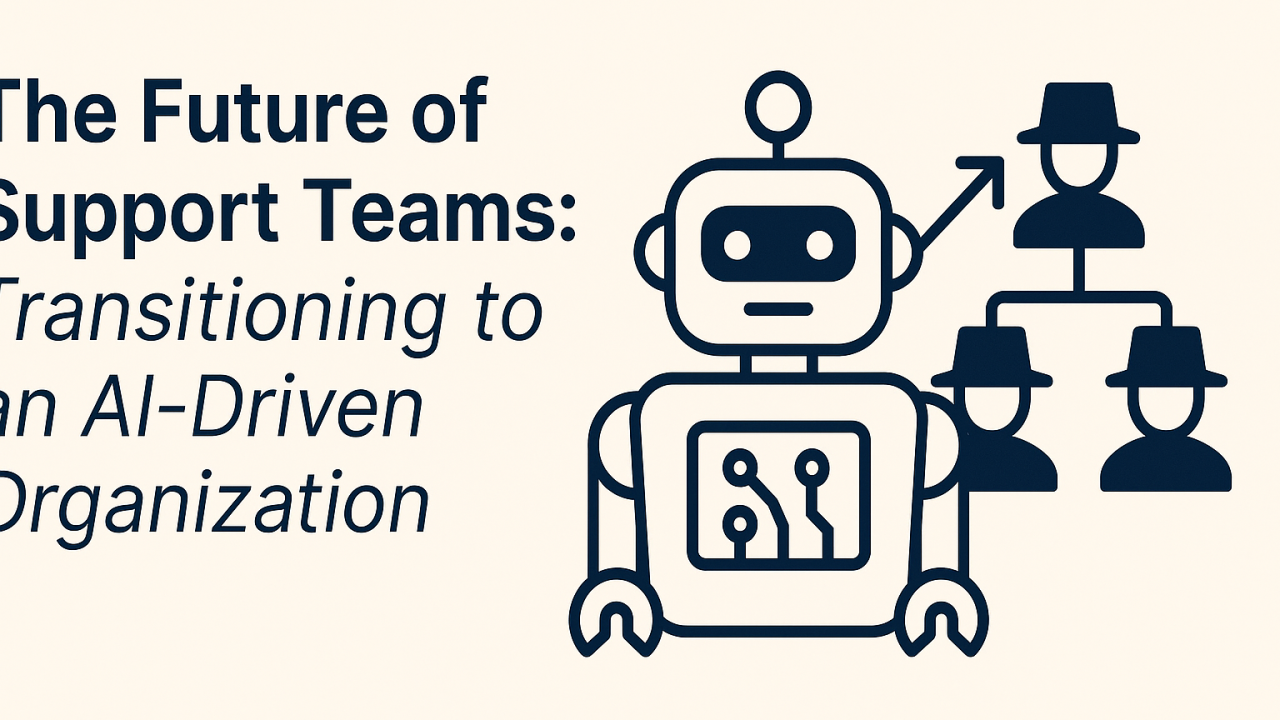The Future of Support Teams: Transitioning to an AI-Driven Organization

The landscape of customer support is shifting. As AI continues to evolve, its potential to handle an increasing number of customer service tasks is becoming undeniable. But what does this mean for today’s support teams? In a world where AI takes over the majority of support functions, how do human teams fit into the picture?
This article takes a detailed look at what an AI-powered support team might look like, exploring the shifts in team structure, skill sets, responsibilities, and leadership. Understanding this future state is key for today’s support leaders to begin preparing for the coming changes.
The AI-Powered Support Team Structure
Current State:
Traditional support organizations are generally large and hierarchical, with multiple layers of roles designed to handle a broad range of tasks. These roles often include customer service agents, team leads, supervisors, and managers. Each role plays a part in ensuring that customer inquiries are addressed, with agents handling the bulk of customer interactions and managers ensuring smooth operations.
Support organizations often focus on efficiency, managing agent performance, and providing escalation paths for complex issues.
AI-Powered Future:
In the AI-driven future, the team structure will be much smaller and leaner. Support teams will no longer need to handle high volumes of routine customer inquiries manually. Instead, AI tools will take over the majority of these tasks. The human team will be reduced to highly specialized roles focused on optimizing AI tools, enhancing customer experience, and handling edge cases.
Key roles will include:
- AI Optimization Specialists: Experts in AI and machine learning, responsible for continually training and improving the AI systems.
- Escalation Managers: Professionals skilled at handling sensitive or complex issues that AI cannot resolve.
- Customer Experience Strategists: Focused on designing the customer journey and ensuring that AI delivers a seamless and empathetic experience.
Key Shift: Teams will become smaller and more specialized, with a focus on overseeing and enhancing the AI systems that handle customer interactions.
Skills Shift: From Generalists to Specialists
Current State:
Most support agents today are generalists. They handle a wide range of customer issues using a mix of product knowledge, communication skills, and problem-solving techniques. While many have been trained in soft skills like empathy, they tend to lack the deep technical expertise required for more complex or specialized tasks.
Support managers and team leaders are skilled in people management, performance tracking, and resource allocation, but they often lack expertise in advanced technologies like AI, automation, or data analysis.
AI-Powered Future:
The future support team will require a different set of skills. As AI takes over routine tasks, human employees will need to adapt to more specialized roles:
- AI and Automation Experts: These individuals will need to understand how to train AI systems, troubleshoot errors, and adjust the AI to fit changing customer needs.
- CX Experts with Tech-Savvy: Customer experience designers will need a deep understanding of how AI influences the customer journey and how to design proactive, personalized experiences using AI-driven insights.
- Human-AI Interaction Experts: These specialists will ensure that AI and humans work together effectively, managing escalations, guiding AI decision-making, and maintaining customer satisfaction.
Key Shift: Support teams will transition from generalist roles to specialized roles requiring advanced technological expertise, including AI and machine learning, along with advanced customer experience strategies.
Responsibilities: Proactive AI Management vs. Reactive Support
Current State:
Support teams today are primarily reactive. Agents handle customer queries as they arise, often performing repetitive tasks like answering FAQs, troubleshooting technical issues, and managing customer complaints. While some support organizations have automated simple tasks (such as chatbots for basic inquiries), the majority of support work is still done by human agents.
Managers oversee agent performance, monitor KPIs, and manage the flow of customer interactions. Their focus is on optimizing human efficiency, resolving escalated issues, and ensuring customer satisfaction in the moment.
AI-Powered Future:
As AI handles more and more of the routine tasks, human team members will shift to more proactive roles. Instead of responding to issues as they come in, team members will be responsible for:
- Optimizing AI Tools: Continuously improving AI systems by feeding them data, tweaking algorithms, and ensuring they’re operating efficiently.
- Handling Complex Escalations: While AI will be great at handling routine inquiries, it will still struggle with complex or emotionally charged situations. Escalation managers will step in when a customer requires human empathy or when AI hits a limit.
- Proactive Customer Experience Design: Rather than merely responding to customer needs, the human team will focus on anticipating customer issues and designing experiences that prevent problems from arising.
Key Shift: The focus will shift from reactive problem-solving to proactive system optimization, customer journey design, and handling complex, high-value cases that AI can’t manage.
Technology Adoption: A Fully Integrated AI Ecosystem
Current State:
Most support teams today still rely on a mixture of human agents and limited AI solutions. Many teams use chatbots or simple AI tools for ticket routing, but the integration of AI in support is still in its infancy. Tools are often siloed, and data doesn’t always flow seamlessly between systems.
Support teams also spend significant time switching between different platforms to access customer data, resolve issues, and track performance.
AI-Powered Future:
In an ideal AI-driven future, AI will be integrated across all aspects of the support process. From ticket routing to customer communication, the AI will have access to all customer data, allowing it to resolve issues, answer questions, and predict customer needs without human intervention.
Key components of an AI-powered support system will include:
- Seamless Data Integration: AI systems will communicate with all other business tools—CRM, chat platforms, knowledge bases, and more—ensuring that every customer interaction is informed by the most up-to-date information.
- AI-Powered Insights: AI will provide leaders with real-time, actionable insights about customer needs, allowing them to quickly make adjustments to the system or customer experience.
Key Shift: The AI-powered future will require deeper system integration, where all tools are connected and AI is at the heart of customer interactions, not just an add-on.
Customer Experience Focus: Proactive, Personalized Support
Current State:
While customer support teams today work hard to provide good customer experiences, much of their effort is reactive. When customers reach out, agents try to solve their problems as efficiently as possible. However, customer interactions are often standardized and impersonal.
Many support teams still struggle to personalize experiences, relying on scripts and standardized responses.
AI-Powered Future:
AI will provide personalized, proactive experiences by analyzing customer data, predicting needs, and offering tailored solutions before customers even ask. AI will be able to:
- Personalize Every Interaction: By analyzing previous customer behavior, AI will personalize the conversation, offering solutions based on individual preferences and past interactions.
- Anticipate Needs: AI will identify trends and issues before they become widespread, allowing support teams to take preventive actions and improve overall customer experience.
Key Shift: Instead of reacting to customer complaints, support teams will design a proactive, personalized experience driven by AI, focusing on anticipating customer needs rather than solving problems after they arise.
Conclusion: Bridging the Gap Between Today and Tomorrow
The gap between today’s support teams and the future AI-powered organization is clear. Human teams will become smaller, more specialized, and focused on managing, optimizing, and enhancing AI systems. Routine tasks will be automated, and AI will handle a majority of customer interactions.
To bridge this gap, support leaders must start investing in:
- AI Training: Equip teams with the skills to manage and optimize AI tools.
- Customer Experience Design: Shift the focus from reactive problem-solving to proactive customer journey management.
- Technology Integration: Move towards a fully integrated AI ecosystem that connects all tools and customer data.
The shift to an AI-powered support team won’t happen overnight, but by starting the transition today, support leaders can ensure they’re ready for the future. The key to success will be evolving the support team to add value in new, impactful ways, creating a seamless experience for customers while leveraging the power of AI.

